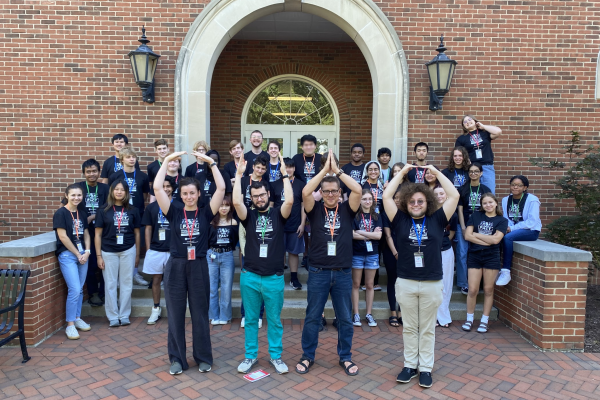PACT Offers New and Old Camp Themes to Inquisitive High School Students in 2024

Philosophy and Critical Thinking (PACT) summer camp, hosted by the Department of Philosophy and Minorities and Philosophy (MAP) student organization, welcomed its seventh year of participants for two weeks in mid-June. High school students attended from Central Ohio, Cincinnati, and Cleveland as well as from Arkansas, California, Connecticut, and New Jersey. PACT ran two different themes for the first time this year, and many campers elected to attend both weeks. Need-based scholarships were offered to campers through the generosity of donors.
In the first week of PACT, campers learned how philosophers think about artificial intelligence. Sahar Heydari Fard, assistant professor of philosophy, presented on how algorithms can be biased or produce unfair outcomes for individuals even without any explicit intention on the part of the designers to do so. Tristram McPherson, professor of philosophy, introduced various theories of consciousness and led a discussion of whether AI can be conscious and, if so, how we should respond to conscious AI. Chris Pincock, professor of philosophy, asked campers to consider the proposal to gradually upload one’s consciousness as a form of a more general sorites problem about continuity of identity. Charles Crumpler, graduate student in philosophy, presented on various theories of what counts as art, then asked campers to apply these theories to “art” produced by AI. Jake Beardsley, graduate student in philosophy, presented on how ethical reasoning is a kind of skill and then asked campers to identify the ways in which AI can both improve and degrade our ability to practice this skill. Dana Howard, assistant professor in the division of bioethics, presented on whether, and if so, how generative AI can improve health care decision-making by a patient’s surrogates, especially at the end-of-life. Eden Lin, associate professor of philosophy, presented on how an artificial superintelligence (ASI) might one day pose an existential risk for humanity. Loane Forest, graduate student in philosophy, asked students to think about which professions are more and less likely to be replaced by AI in order to help them understanding the arch of technological unemployment. Finally, Loane and Jake presented various theories on meaning in life and asked campers to apply these theories to a world in which AI does all the work.
In the second week of PACT, campers explored the connections between and tensions among science, faith and reality. Charles Crumpler introduced various forms of skepticism about the existence of an external reality in order to identify different justifications that one might offer for one’s beliefs. Steven Brown, associate professor of teaching in the department of philosophy, helped campers understand the value of justifications that are simpler, less ad hoc, and more explanatory. Eden Lin presented on the possibility of uploading our minds to a virtual simulation. Lisa Downing, professor of philosophy, lectured on whether the scientific revolution was a revolution in science or a revolution in philosophy. Tristram McPherson discussed whether our best scientific theories are literally true or just useful fictions. Richard Samuels, professor of philosophy, led campers through a discussion about the question of whether science discredits religion. Chay Robert Rossing, an undergraduate major in philosophy, presented the fine-tuning argument to campers and considered various responses to it. Jake Beardsley presented the free-will argument and soul-making argument as responses to the problem of evil in a world created by an omnipotent, omnibenevolent, and omniscient god. Steven Brown lectured on ways of explaining why there is something rather than nothing. Charles Crumpler explained Pascal’s wager to campers as well as various objections to it. Finally, Steven Brown offered an argument for what it means to have faith, why it’s good to have such faith, and how faith does not stand in significant tension with the scientific method or the findings of experimental and theoretical science.
PACT camp is designed as an opportunity for participants to experience college life through engaging with many members of our faculty. Every day began with a community-building “icebreaker” to build trust and mutual understanding among campers that enables them to engage more fully in the learning opportunities that our camp offers. In addition to the academic side, campers completed a scavenger hunt that led them to some of the notable places around the Oval, they ate lunch at several different places around campus with a BuckId, and they had the opportunity to learn more about how to apply to Ohio State with a visit from Austin Martin, assistant director in the admissions office.
Camp concluded each week with a collaborative symposium in which campers offered short presentations to their family and friends. Presentations aimed to share out a significant message learned over the course of the week and then that message was discussed with everyone in attendance in the hopes of making further progress on understanding it. Recordings of these symposia are available on our YouTube channel.
Overall, PACT had another successful year! In response to an anonymous survey, almost every camper agreed that they developed critical thinking skills and learned about the value of studying philosophy in college. One camper reflected: “I learned that sometimes, when posing a problem or question, you don’t need to find an undisputed answer.” The camp could not have happened without admissions support from Anand Ekbote (a graduate student in philosophy), design support from Lauren Fanfer (ASC Office of Marketing and Communications), fiscal support from Maureen Allison, logistical support from Susanna Bell, and curricular training by Amy Shuster. Camp organizers are looking forward to developing next year’s themes and welcoming another cohort of campers in 2025.
